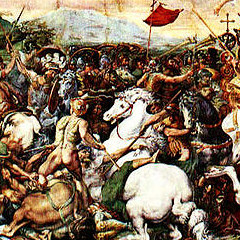
This is true for major events: Constantine battling at Milvian Bridge, Luther protesting at Wittenberg, King James commissioning the Bible that bears his name, Whitefield going on tour in America, Revere sending out the alarm en route to Lexington, and Patton storming the coasts of Sicily.
It’s also true for the humbler moments: Jane Austen quietly revolutionizing English literature, Gen. Robert E. Lee writing tender letters to his distant wife, and Anne Bradstreet penning poetic lines that touch people to the present day. The story of God’s past providence in our lives provides several vital things for us now and in the future:
1. Hope. When you know what people did, what God did, you know what they might do. You get a sense for what’s truly possible. Expanding our knowledge of the past becomes a way to expand our hope for the present and beyond.
2. Understanding. Our world is built with bricks of past events. History gives us the context to understand our own times and places, and the people we share them with. Consider:
- issues such as immigration
- practices such as prayer
- institutions such as governments
- movements such as revivals
Each of these is affected by the past. Our intelligent, responsible, intentional action in the present requires the understanding that history affords.
3. Imagination. Stories fire our imaginations. In this way history has the same potential to captivate and inspire as do great novels or epic movies. Romances, wars, sacrifices—these are the stuff of history and their resonance in the minds and hearts of readers is only limited to the storytelling ability of the writer.
4. Connection. As people created by a personal God we crave personal connection in any number of forms, but particularly in sympathy and empathy. Reading about the lives of others, their struggles, their victories, we can connect with them and our lives and experiences find enrichment that would otherwise remain lost.
5. Perspective. We don’t look at the world the same way our ancestors did. Every age has a different angle on life. History helps us pick up glimpses of how our forebears saw the world and so helps us glimpse the differences in our own outlook. While we might see some things more clearly today (e.g., slavery), their take on another issue may highlight flaws in our present-day outlook. History is corrective lens through which to view our circumstances.
6. Defending Truth. The past is always remembered. It’s not here any longer so we have to recall it, retell it, re-member it. But it can be re-membered by anyone with any point of view; that means that history can be used as a weapon against the church. Take the reverse of that and something else emerges: Christians telling the story of God’s past providence is one of the most important forms of apologetics.
7. God’s Call. In the scriptures, when God’s servants called upon his people to live up to their potential in him, they recalled the Exodus—how God brought Israel out of Egypt with a mighty hand and by a stretched out arm. Reading history is vital way to hear God’s call on our lives through the stories of others. It speaks to his faithfulness in the past and our lives in the present.















